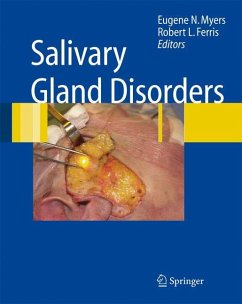
Salivary Gland Tumors
A review on salivary gland tumors
Versandkostenfrei!
Versandfertig in 6-10 Tagen
32,99 €
inkl. MwSt.

PAYBACK Punkte
16 °P sammeln!
Salivary gland tumors are uncommon representing only 3% of all head and neck cancers, which in turn account for 3% of all malignancies. The American joint cancer committee s (AJCC) tumor, node, metastasis (TNM) has defined a staging system for major salivary gland malignancies. Cancer from minor salivary gland scattered throughout all the head and neck mucosa are staged according to the AJCC system. Surgery of primary tumor, whenever possible, is the treatment of choice both for major and minor salivary gland tumors. A clinically positive neck requires a neck dissection along with the resectio...
Salivary gland tumors are uncommon representing only 3% of all head and neck cancers, which in turn account for 3% of all malignancies. The American joint cancer committee s (AJCC) tumor, node, metastasis (TNM) has defined a staging system for major salivary gland malignancies. Cancer from minor salivary gland scattered throughout all the head and neck mucosa are staged according to the AJCC system. Surgery of primary tumor, whenever possible, is the treatment of choice both for major and minor salivary gland tumors. A clinically positive neck requires a neck dissection along with the resection of primary tumor. The treatment of N0 neck in patients with malignant salivary gland tumors is a matter of debate. Adjuvant radiotherapy improves locoregional control following surgery. Radiotherapy can be the best treatment option in case of technically unresectable or medically inoperable tumor. The use of concomitant chemotherapy in salivary gland cancer is still investigational. Chemotherapy is delivered in case of relapsed and/or metastatic disease with a palliative aim.












